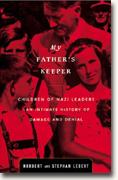My Father's Keeper
Stephan & Norbert Lebert
book reviews:
· general fiction
· chick lit/romance
· sci-fi/fantasy
· graphic novels
· nonfiction
· audio books
· author interviews
· children's books @
curledupkids.com
· DVD reviews @
curledupdvd.com
newsletter
win books
buy online
links
home
for authors
& publishers
for reviewers


|
My Father's Keeper: Children of Nazi Leaders--an Intimate History of Damage and Denial Stephan & Norbert Lebert Little Brown & Co. Hardcover 256 pages September 2001  |
|
Stephan Lebert had rediscovered the manuscripts written in the late fifties of his father's profiles of Nazi children -- including Chief of the SS Heinrich Himmler's daughter Gudrun, Reichsleiter (and second in real political power only to Hitler) Martin Bormann's son Martin, and Governor-General of conquered Poland Hans Frank's son Niklas. Lebert re-interviews many of these same Nazi children in order to investigate the problems raised by the relationship between perpetrator father and seemingly innocent child. The design of the project itself, with Norbert Lebert's original profiles and Stephan Lebert's updated ones, makes this a unique opportunity to look at this issue. That both Leberts are journalists limits the scope of their investigation in My Father's Keeper, but it often allows them to uncover startling details. Some of these "children" cannot accept the reality of their father's infamy. Gudrun Himmler, for instance, continues her involvement in Stille Hilfe, a charity that helps old Nazis. Wolf-Rudiger Hess insists that his father Rudolf Hess was murdered in Spandau Prison to keep him quiet. Others display a more ambivalent or even hostile relationship. Martin Bormann, Jr., who reveals that whenever Hitler entered a room it suddenly felt cold, understands the crimes of the National Socialists but cannot help but still love his father. Niklas Frank, however, talks of his own attempt to annihilate his father's memory through public expose. But My Father's Keeper cannot make convincing larger conclusions, partially because of the limitations of journalism, the reticence of his subjects, and the brevity of this book. When conclusions are drawn, Stephan Lebert looks to others such as psychologist Wolfgang Schmidbauer's. So, for Lebert, the reason that it was comparatively easy for most of the children of perpetrators, as well as their parents, to inhabit the post-war world was because "the perpetrators had to deal only with their fear of being caught and condemned." Once German society had moved on, publicly purging many of the more monstrous members, those perpetrators and collaborators, as well as their children, could move on also. To the victims, however, the pain of torture relived itself every moment of every day. As Lebert sums it up, "torturing body and spirit has measurably fewer side effects than being tortured." My Father's Keeper should be commended for what it is: a unique portrait of these children of Nazi oppressors. Occasionally its strange structure detracts from the overall quality of the work, as does the jarring difference in style between the two Leberts. But the portraits themselves, especially those of the older, more dispassionate Lebert, provide a glimpse into a world thankfully few of us know. © 2001 by Martin Schmutterer for Curled Up With a Good Book |
|
|
|
 Click here to learn more about this month's sponsor! |
|
| fiction · sf/f · comic books · nonfiction · audio newsletter · free book contest · buy books online review index · links · · authors & publishers reviewers |
|
| site by ELBO Computing Resources, Inc. | |
 family lineage holds one of the cruelest men in history? It is not her fault to be born into this family. She does not carry her uncle's guilt. Yet her propinquity to one of the previous century's monsters sets her apart. It is this question of the meaning of the legacy of the Nazi past to the children of the perpetrators that Stephan Lebert turns to in his new book, My Father's Keeper.
family lineage holds one of the cruelest men in history? It is not her fault to be born into this family. She does not carry her uncle's guilt. Yet her propinquity to one of the previous century's monsters sets her apart. It is this question of the meaning of the legacy of the Nazi past to the children of the perpetrators that Stephan Lebert turns to in his new book, My Father's Keeper.